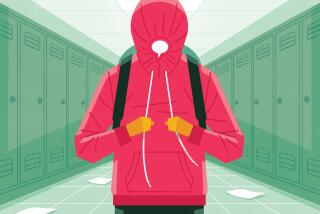Teens Urge Peers to Play It Safe : * High school students find it’s often easier to talk to their counterparts, trained by Planned Parenthood, about safe and responsible sex.
- Share via
ANAHEIM — The workshop was called “Play It Safe,” and its purpose was to arm high school students with basic facts about how to prevent pregnancy and protect themselves from sexually transmitted diseases.
But the 30 teens were not subjected to a panel of adults giving somber lectures on the merits of abstinence or the how-to’s of safe sex in the perilous age of AIDS.
In fact, post-adolescents remained on the sidelines of this lively session, part of a Planned Parenthood teen conference held Saturday in Anaheim.
The workshop was run by Planned Parenthood’s peer educators, a group of outgoing, articulate high school students who created an atmosphere in which participants could comfortably discuss such topics as the unreliability of the rhythm method, the reasons for using condoms and the side effects of the pill.
The teen organizers decided to inject some fun into the educational event by turning one of the meeting rooms at the Pan Pacific Hotel into a giant game board. They covered the floor with large, colorful signs, each one posing a question related to safe sex. And then they divided their audience into teams of five.
The participants, clustered together between strings outlining makeshift cars, rolled the dice and marched from one square to another, advancing as they came up with the right answers and staying put--unhappily--when they didn’t.
They laughed, cheered and argued their way to the finish, where winners were given a poster warning them about the connection between drinking and risky sexual behavior.
The teams became highly competitive as they watched each other progress--or fall behind.
They squealed with delight when they landed on the square that read: “You respected your partner when she said ‘no.’ Go ahead three spaces.” And they groaned when they reached the one that read: “You got drunk at a party and forgot to use birth control. Go back four spaces.”
The same questions stumped one team after another. For example, several failed to correctly answer this deceptively simple one: “What is the best form of protection against sexually transmitted diseases and pregnancy?”
“Condoms!” one team shouted in unison.
“Wrong,” said a peer educator. “It’s abstinence.”
Tammi Litke, a Planned Parenthood volunteer who made sure the students were given the correct answers for the questions they missed, said overall, they seemed well-informed.
But Planned Parenthood’s peer educators said they know many high school students who wouldn’t have been able to get past the first few squares of the game.
Their efforts to get information to teens have made them more aware of how misinformed and ignorant their peers are on the subject of sex--and how reluctant they are to turn to parents, teachers or other adults for answers.
The Peer Education Program gives teens a chance to go to someone their own age for information about birth control and sexually transmitted diseases, noted Lori Seeboth, Planned Parenthood’s Community Education coordinator.
The peer educators, who receive 30 hours of training before they start teaching others, were hired at minimum wage last June to perform educational skits at the beach during the summer, hand out pamphlets at the Orange County Fair and plan the program for Saturday’s teen conference.
The annual conference, which had a smaller-than-expected turnout of about 65 teens, attracted two uninvited guests--abortion foes who stood in front of the hotel with picket signs objecting to Planned Parenthood’s pro-choice stance.
But that didn’t interfere with what was going on inside: workshops on date rape, sex in the media and personality analysis as well as safe sex and a performance by Project Able, a Los Angeles street theater group that presented a skit about AIDS.
There was also a brief appearance by 15-year-old Kelly Williams of TV’s “Family Matters,” who spoke to the six peer educators between workshops.
“I have friends who indulged in sex early and got pregnant at 12. It can ruin your life,” she told them.
Asked how she resists peer pressure, she said: “My mother resists it for me. I can’t make a move without her knowing about it. I can talk to my parents about everything. You need them to help keep you on the right track.”
The peer educators, gathered around a table with Kelly and a reporter, nodded in agreement. In an interview just before the young actress arrived, several of the teens said they’ve been able to talk more openly about sex with their parents since they got involved with Planned Parenthood.
And 17-year-old Amy Thayer of Los Alamitos High School said: “It’s a lot easier to talk to my friends about sex now because I’ve had to talk to strangers about it. I’m a lot more comfortable with the subject.”
As word has gotten out in their schools that they work for Planned Parenthood, the peer educators have been approached by friends--and even strangers--with questions, mostly about how to get birth control, the teens said. That’s seldom covered when sex is discussed in school health classes, noted Natalie Adams, a 17-year-old student at Santiago High School in Garden Grove.
She said she always takes a bag filled with condoms to parties and puts it in a place where it can’t be missed.
“That’s where something’s most like to happen, so I bring them along as a reminder,” she explained.
“We don’t promote sex; we promote responsibility,” stressed Demian Garcia, 18, of Garden Grove High School. “You can’t just say, ‘Don’t have sex,’ because some people will do it anyway, and they need help making decisions that are responsible.”
The results of irresponsibility are all too evident to high school students today; teen pregnancy is so common that it’s no longer shocking to see pregnant girls in the halls at school, Natalie said. “It’s reality for us. Sex isn’t talked about enough, but it’s being done more than it should be.”
When is the right time to start having sex?
“When you’re not scared. When you feel definite about it. You shouldn’t be forced into it by your peers,” Natalie said.
But Amy Thayer said for those who want to be popular, peer pressure is hard to resist.
“A lot of people among the ‘in crowd’ believe it’s uncool to say no,” she said. Some teens turn to sex because it’s the only way they can win acceptance from the social group they long to join, she added.
Amy doesn’t see abstinence as a social liability, however. “Being safe is being cool,” she said, noting that she draws a lot of satisfaction from giving her peers “facts instead of myths.”
The myths, the peer educators said, still prevalent among teens include the beliefs that withdrawal is the best form of birth control, that sexually transmitted diseases always have obvious symptoms and that AIDS is the only one they need to worry about.
There are others, too.
“A lot of kids believe that the first time they have sex, they can’t get pregnant,” Amy said. “And they think they’re too young to contract a disease.”
“I always thought only weirdos and gross people caught sexually transmitted diseases,” admitted Julie Mailhot, 17, of Santiago High School in Garden Grove.
AIDS scares teens, Amy noted, but they tend to start worrying about it only when it’s too late to protect themselves.
“Because we are teens, we think we’re invincible. We don’t think it can happen to us,” observed Jim Rainey, a 17-year-old Los Alamitos High School student.
The peer educators have been trying to change that attitude. And through their training and teaching, they have strengthened their personal resolves to abstain or, if they are sexually active, to take precautions.
“The education we’ve received might have prevented one of us from getting pregnant or getting someone pregnant,” said Demian Garcia.
“It’s helped me make choices for myself,” added Elisabeth Lamar, a 16-year-old Garden Grove High School student. “When I become sexually active, I will know what to do.”
The frankness of the peer educators at Saturday’s conference was a welcome change for teens unaccustomed to straight talk about sex at home or at school.
Stacey Sharer, 14, who attended the conference with several classmates from Orange High School, said teens are reluctant to talk to their parents about sex because “they’re afraid they’ll say something wrong and make them mad.”
And they’re afraid their parents will make them feel ashamed if they find out they are sexually active, added Angie Echavarria, 14, of Orange High School.
Stacey and Angie, who were encouraged to attend Saturday’s conference by their health education teacher, said they get some information at school, but not nearly enough.
Angie pointed out that her health class recently watched a film on AIDS, then had only 10 minutes to discuss it. She recalled: “Everybody was left with this eerie feeling, and our teacher didn’t have enough time to explain the film to us. We were walking out of class scared, shocked and confused and we didn’t know what to do.”
“At school, they can’t explain how things are in real life,” Stacey said. “Here (at the conference), they’re a lot more open. They just explain how it is.”
More to Read
Sign up for Essential California
The most important California stories and recommendations in your inbox every morning.
You may occasionally receive promotional content from the Los Angeles Times.













